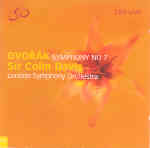Colin Davis remains an enigma. Recently I have seen him conduct some of the most exciting and enjoyable concerts imaginable, and yet the majority of his LSO recordings have been mediocre to terrible, graphically illustrating the dangers of letting the inmates run the asylum when it comes to selecting repertoire to issue on disc. Davis hasn’t been helped by the fact that he has previously recorded (mostly excellently) virtually everything released by LSO thus far, and so faces competition from his younger, generally more alert and dynamically charged self. One of his very best recordings is Dvorák’s Seventh Symphony with the Concertgebouw Orchestra, a performance that has long stood as a reference version of the work. It’s available coupled with the Eighth and Ninth Symphonies on a Philips Duo twofer, and as such represents a significant bargain.
This newcomer, while not bad, is much less impressive. Davis has added a minute or so to each movement, and the heaviness tells. He still has the measure of the work’s drama, but the exigencies of live performance conspire to drain much of the vitality from the interpretation. In the first movement, transitions such as that between the first and second subjects, and his stop-and-start approach to the latter, make the music drag. At the big climax, the trumpets play far too loudly, a minor point perhaps but an irritation that significantly diminishes the impact of the passage. The second movement sounds self-conscious just where it needs to flow naturally (Davis has become a “micromanager” over the years, unable to leave a simple phrase alone). That famous passage with solemn, low trombone chords in ambiguous harmony answering probing violin lines practically stops dead in its tracks. The scherzo finally wakes up and offers the energy and rhythmic snap that characterizes Davis’ Philips recording, but the finale gets shackled by a constant, irritating breath-pause every time the little fanfare figure in dotted rhythm returns (first heard at the beginning on the clarinet), which it does frequently.
The playing of the LSO is good, but it’s no match for the Concertgebouw–and it lacks tonal allure. Strings have little body or warmth; the winds are miked too closely and so stick out unnaturally; and the brass tend to sound raw and “in your face”. Even at budget price, 40 minutes of playing time is certainly no bargain, so this release, while certainly not the worst of the lot, remains obstinately uncompetitive. It’s frustrating, not being able to support this initiative more enthusiastically, but unfortunately the people in charge of this project at the LSO seem completely oblivious to issues of performance quality, sonic excellence, or the reality of today’s marketplace, and–with a few exceptions, such as the recent Berlioz Les Troyens–are rapidly building a catalog of comparative failures. What a shame!
































